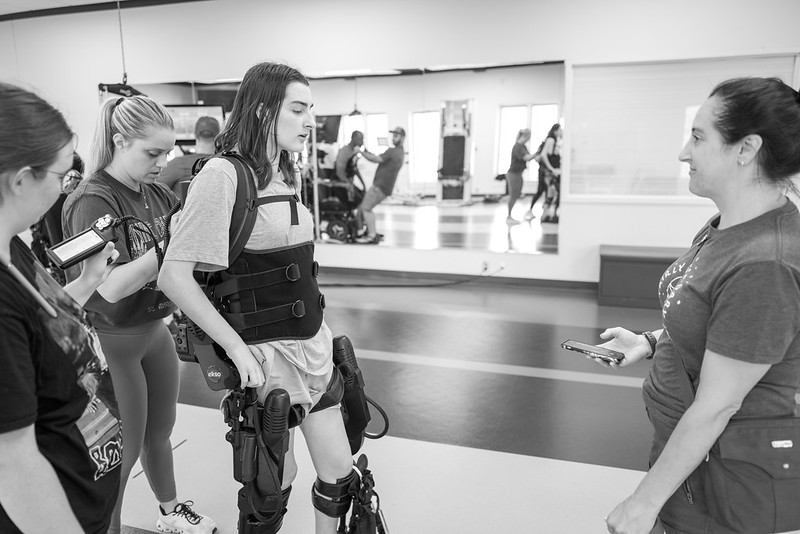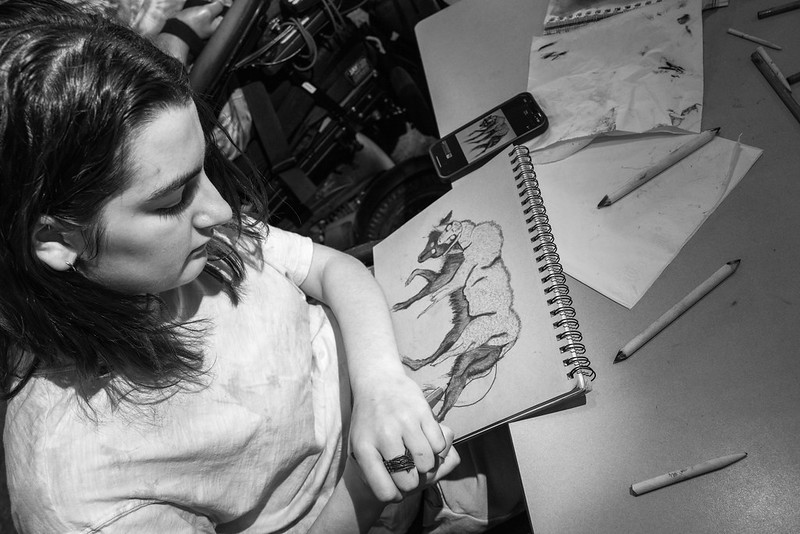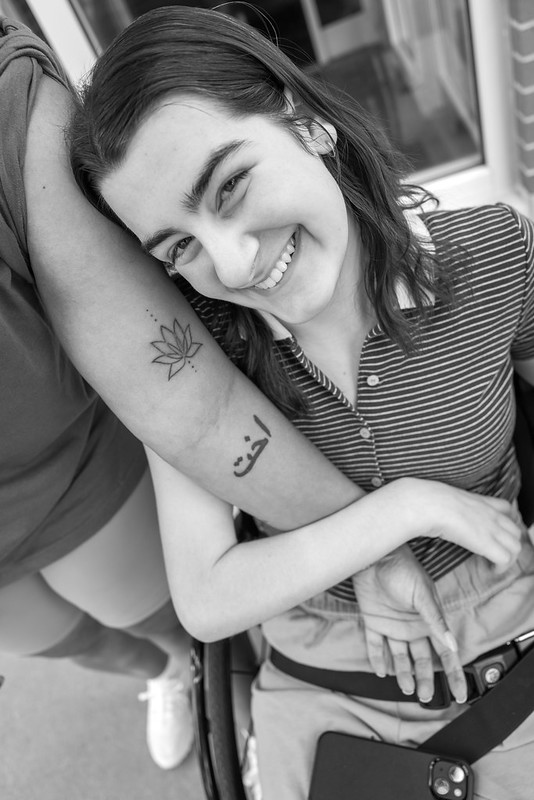Discovering Inner Strength
If you were to ask Lotus Friedman where she wants to go to college, without a moment’s hesitation she would say “Santa Monica College,” and likely punctuate that statement with a kind of sidelong look, as if you might have wrongly questioned any doubt in her mind. Because there isn’t. Had you asked the question to Lotus five years ago, it probably would have been the same answer. Her mind is always years ahead—planning for every little nuance and path life might take.
It’s how she spends some afternoons in the Gait Lab in July 2024—working out various strategies with physical therapist Anna Schaffart. She’s testing out QLI program graduate Christian Arteaga’s Companion Q. This battery-powered wheelchair attachment can add propulsion, and allow the user to
Lotus stops, again with that quasi-snarky quasi-judgy look. “This?” she exclaims. “In a coffee shop!? No way. Look how big this thing is.” She waves her arm to indicate that yes, it might be a little unwieldy in close-quarter rooms.”
“Ok,” Anna laughs. “You can take it off like this,” which she demonstrates. “And prop it up against the table.” She leans it back against the wheelchair. “See? It’s not as big as you might think.”
Lotus pauses for another beat. “Well, I think it’s still a little weird.” Though said in a sarcastic and joking manner, the conversation shifts to the true practical means of the device—while the device is a bit bulky, it will be tremendously useful for long distances like going from one end of her college campus to the other. Lotus absorbs this argument—considering when she’ll move to California, still a few years out. The rest of the session, spent on some core strengthening exercises, is a nice reset, moving along at a great pace. The relationships Lotus has built with her clinical team are unique—they are not a month or two old, but rather ones that have been growing for over two years, since around the time of her spinal cord injury.
A Life-Altering Injury
On a family ski trip in 2022, Lotus fell from a great height while on a route, sustaining a debilitating spinal cord injury. Following a stay in intensive care at St. Luke’s Hospital in Cedar Rapids, Iowa, Lotus arrived at QLI. Lotus was just 13 at the time. Time away in Omaha to recover meant time spent out of school, not getting to be with her friends and peers in such a crucial developmental period. To say it was difficult for her would be an absolute understatement.
Rehabilitation Begins at QLI
“The last time I came to QLI,” Lotus reflects, “I wasn’t in a good place in my recovery, certainly not enough to go straight home from the hospital. In the six months I was at QLI, I just wanted to go home.” There were hopes of big change in a short amount of time, which could prove difficult. “I can be a very stubborn person. I don’t give up easily, but waiting a long time to see small improvements is hard on me. QLI is great because I’m around people with injuries like mine, but I can see some of my peers progressing at a very fast rate in comparison to where I am. But I have to understand myself and know that even if I’m not where I ideally want to be, I don’t have to fit a definition of ‘Oh you’re two months out of your injury so you’re not going to make any more progress.’ It’s an ongoing thing. Yes, I’m in a wheelchair. But I have to accept that fact. I also have to accept that if I want a better future for myself, I have to work towards it, not just wait for something to happen.”
Two years ago, the team at QLI began a program that helped Lotus work towards a better future. The focus was on getting her back home with her family and in the classroom—getting ready in the morning, being strong and able to function in a wheelchair all day, and relearning to utilize hand tools to work on a laptop.
The Power of Family and Community Support
Lotus was extremely fortunate to have a loving and supportive family behind her, who would continue to be at her side following her initial discharge back home to Iowa. “But,” Lotus notes, “there won’t be a safety net like that when I move across the country for college. Coming back to QLI allows me to iron out those final pieces.”
“Lotus is so good at relationship building,” life path assistant Janelle Thomas remembers warmly. “She might tell you at first that she’s an introvert and doesn’t like people, but it’s completely the opposite. Lotus is a natural at building deep connections with others.” After discharging in 2022, Lotus regularly checked in with her team, her family sent updates on her continued progress.
Then, as Lotus grew more comfortable and reoriented her focus to college and adulthood, the conversations with QLI also shifted to asking if Lotus would benefit from a “boot camp” of sorts. After getting insurance approval, her team welcomed her back to campus for the second time.
“We’ve gone over how I can engage with the community out there, what my supports will be and how to plan for backup plans,” says Lotus. “We’re finding solutions for independence and learning how they can work best to serve myself and what I choose to do in my future.”
Overcoming Challenges in Recovery
Those solutions involve some experimentation. “We knew there would be a tighter timeline to reach goals while she was here a second time, says Anna, “and Lotus started right away with specific and very achievable goals.” Lotus wanted more independence with her activities of daily living (ADLs). She also wanted to spend some time walking with the Ekso bionic exoskeleton to see if, two years removed from her injury, there could be some return in mobility. Another was navigating her community with confidence. The deep trust that Lotus already had with her clinicians meant that they could immediately leap into action move towards these targets.
By the end of her one-month rehabilitation stay, Lotus was “doing a majority of her routines in the morning herself,” notes occupational therapist Sara Waid. “She’s going from an hour-long morning routine to under 40 minutes. For her level of injury, the fact that she’s doing as much as she is with her transfers is pretty phenomenal.”
Advocating for yourself is a key skill set in adulthood and independence, something Lotus worked on closely with Janelle. “I would tell Lotus, ‘Think of something you want to do or somewhere you want to go, even if it might make you a little uncomfortable, and let’s go do it. There’s still some social anxiety with navigating through stores and the community,” says Janelle, “but we can push past that. She’s learned to own the situation and go about her tasks like anyone else would. People look at her and they respect Lotus. They don’t see through her.”
Looking Forward – A Journey of Resilience
“At a very young age, she went through more than some people do in their lives,” says Janelle. “She was at that stage in her life, where you’re still trying to figure out who you are. Lotus may have hard days but she moves through them with such grace and strength.” Before Lotus was discharged from QLI for the second time in July 2024, Lotus’ mother Billie approached Janelle and rehabilitation trainer Yanci Herrera, with the idea that the three of them get matching lotus flower tattoos, which they did, just in time for her to leave.
“Coming back to QLI,” says Lotus, “and having that be my choice, and allowing myself to work hard towards this independence—it pays off. Everything here will help me in the long run.”
Categories: Client Story


